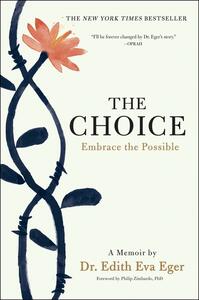Take a photo of a barcode or cover
challenging
emotional
inspiring
reflective
sad
fast-paced
This was one of those books that even though it only took me a few days to read, I found myself thinking about it constantly. The story telling quality of this memoir is gripping and the wisdom that is shared throughout is honest and impactful. We cannot escape suffering, and we cannot control what happens to us, but the fundamental truth that Dr. Eger conveys is that we can decide how we react and how we shape our futures after experiencing life and it’s traumas.
Through her own experiences of surviving Auschwitz, and the devastating loss of her parents, Dr. Eger writes of her own process struggling and managing through trauma and grief and how she has not allowed her experiences to define her life and future. 5/5 stars. Masterful.
Through her own experiences of surviving Auschwitz, and the devastating loss of her parents, Dr. Eger writes of her own process struggling and managing through trauma and grief and how she has not allowed her experiences to define her life and future. 5/5 stars. Masterful.
inspiring
medium-paced
4.5 stars, 5 stars for the first half and 4 for the second. Her personal narrative of pre and immediately post Holocaust is truly gripping. I found the patient anecdotes in the latter half of the book to be too numerous and the language to get a little loose and paint-brush-y. But all in all I can review this book in two words: “harrowing AF” (and also: “essential reading”).
I really liked this book. The beginning is a typical WWII book. Edith talks about her time in auschwitz. Very heart wrenching as all WWII stories are. The thing I loved about this book was Edith's story afterward. Her path to finding peace and happiness. Recommended for adults only.
challenging
emotional
hopeful
inspiring
reflective
sad
slow-paced
‘My precious, you can choose to be free’.
What a beautiful way to end a book that starts with imprisonment in Auschwitz. From physical imprisonment to emotional freedom, Eger shares her experiences and those of her patients over the years to highlight that one important message - in whatever way works for you, doing whatever you need to do, it is possible to be freed from your past.
I’ve read a few reviews of this book that complain that it is not really about the Holocaust and that the time in camps itself only takes up a third, if that, of the book. Eger spent a year in Auschwitz. She then spent 60 years building a life and recovery away from it. The journey she undertakes to reclaim herself - the Jewish Hungarian dancer - takes up far more space in her life than Auschwitz ever could.
Supplemented by stories of the people she has helped, and the people who weren’t ready for help, as well as her sisters, husband and children, Eger shows the reasons for living and growing with grace and fortitude many do not have to show.
Whilst perhaps the latter content wasn’t so much for me, this book is still worth a read due to its hopefulness, passion for life and joy. At one point Eger suggests she has success as a speaker because ‘if I can survive, if I can do it, so can you’. This selfless reason for sharing her past is beautiful, kind and true.
What a beautiful way to end a book that starts with imprisonment in Auschwitz. From physical imprisonment to emotional freedom, Eger shares her experiences and those of her patients over the years to highlight that one important message - in whatever way works for you, doing whatever you need to do, it is possible to be freed from your past.
I’ve read a few reviews of this book that complain that it is not really about the Holocaust and that the time in camps itself only takes up a third, if that, of the book. Eger spent a year in Auschwitz. She then spent 60 years building a life and recovery away from it. The journey she undertakes to reclaim herself - the Jewish Hungarian dancer - takes up far more space in her life than Auschwitz ever could.
Supplemented by stories of the people she has helped, and the people who weren’t ready for help, as well as her sisters, husband and children, Eger shows the reasons for living and growing with grace and fortitude many do not have to show.
Whilst perhaps the latter content wasn’t so much for me, this book is still worth a read due to its hopefulness, passion for life and joy. At one point Eger suggests she has success as a speaker because ‘if I can survive, if I can do it, so can you’. This selfless reason for sharing her past is beautiful, kind and true.
emotional
hopeful
informative
medium-paced
I read the translated version and I shouldn’t have. It didn’t capture me as much as it should have. Found the story not diving into the material and might be a bit shallow and easy, but understand it is hard to go back to those hard times.
adventurous
challenging
dark
emotional
hopeful
inspiring
reflective
A holocaust memoir, but there is actually not that much about the holocaust in it. It’s about Edith who at 16 is sent to Auschwitz with her parents and eldest sister. Her mother is immediately sent to the gas chambers and they never see their father again, but they survive. She is so skinny at the end she is almost left for dead by the Americans but her sister manages to capture their attention. She then moves to the US and becomes a psychologist. But the book is really about accepting what has happened to you and finding happiness in being alive. It’s quite mindful.





